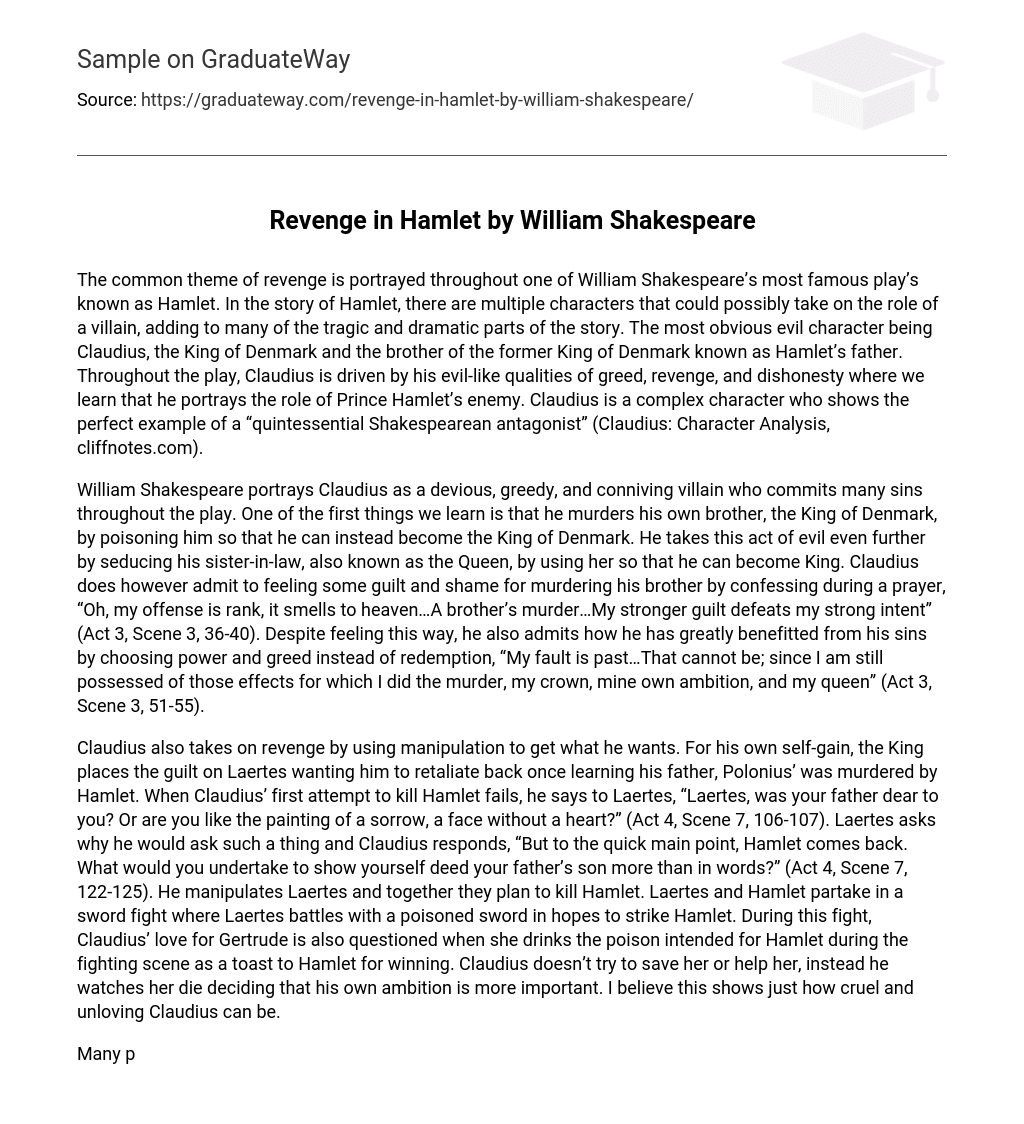The common theme of revenge is portrayed throughout one of William Shakespeare’s most famous play’s known as Hamlet. In the story of Hamlet, there are multiple characters that could possibly take on the role of a villain, adding to many of the tragic and dramatic parts of the story. The most obvious evil character being Claudius, the King of Denmark and the brother of the former King of Denmark known as Hamlet’s father. Throughout the play, Claudius is driven by his evil-like qualities of greed, revenge, and dishonesty where we learn that he portrays the role of Prince Hamlet’s enemy. Claudius is a complex character who shows the perfect example of a “quintessential Shakespearean antagonist” (Claudius: Character Analysis, cliffnotes.com).
William Shakespeare portrays Claudius as a devious, greedy, and conniving villain who commits many sins throughout the play. One of the first things we learn is that he murders his own brother, the King of Denmark, by poisoning him so that he can instead become the King of Denmark. He takes this act of evil even further by seducing his sister-in-law, also known as the Queen, by using her so that he can become King. Claudius does however admit to feeling some guilt and shame for murdering his brother by confessing during a prayer, “Oh, my offense is rank, it smells to heaven…A brother’s murder…My stronger guilt defeats my strong intent” (Act 3, Scene 3, 36-40). Despite feeling this way, he also admits how he has greatly benefitted from his sins by choosing power and greed instead of redemption, “My fault is past…That cannot be; since I am still possessed of those effects for which I did the murder, my crown, mine own ambition, and my queen” (Act 3, Scene 3, 51-55).
Claudius also takes on revenge by using manipulation to get what he wants. For his own self-gain, the King places the guilt on Laertes wanting him to retaliate back once learning his father, Polonius’ was murdered by Hamlet. When Claudius’ first attempt to kill Hamlet fails, he says to Laertes, “Laertes, was your father dear to you? Or are you like the painting of a sorrow, a face without a heart?” (Act 4, Scene 7, 106-107). Laertes asks why he would ask such a thing and Claudius responds, “But to the quick main point, Hamlet comes back. What would you undertake to show yourself deed your father’s son more than in words?” (Act 4, Scene 7, 122-125). He manipulates Laertes and together they plan to kill Hamlet. Laertes and Hamlet partake in a sword fight where Laertes battles with a poisoned sword in hopes to strike Hamlet. During this fight, Claudius’ love for Gertrude is also questioned when she drinks the poison intended for Hamlet during the fighting scene as a toast to Hamlet for winning. Claudius doesn’t try to save her or help her, instead he watches her die deciding that his own ambition is more important. I believe this shows just how cruel and unloving Claudius can be.
Many people will also argue the fact that Hamlet is also a villain of this story, for Hamlet does take part in villain-like acts including the plan to Kill Claudius and finally doing so at the end of Act 5, the killing Polonius and how he treats Ophelia poorly for he is abusive and controlling. However, there are differences between Hamlet and Claudius. What makes Claudius a villain is that he is wrong and that Hamlet is right (Claudius: Character Analysis, cliffnotes.com). Claudius murdered and lied, everything he did was behind closed doors hidden from the people and the Queen, while never asking for forgiveness. Hamlet commits his crimes in the open for everyone to see and in the end, he pays for what he has done. Hamlet regrets the crimes he has made and seeks remorse before he dies, but Claudius is the opposite receiving no remorse from anymore. Said in the article When the Villain Steals the Show, “And when Hamlet speaks of Claudius it is with a degree of contempt he usually reserves for himself; his stepfather is a “damned villain” (Litvin, Margaret. “When the Villain Steals the Show” Pg. 4).
Many of the traits that Claudius possesses contribute to him as a character of revenge and villainy. As stated in the article Teaching Hamlet, “Claudius is more contemptible in that his emotions are more shallow and common place. He has committed a crime, but he has no need to wade on in blood because he can live with the memory of murder” (Ornstein, Robert. “Teaching Hamlet.” Pg. 7). Claudius is greedy, corrupt, manipulating, deceiving and he will do whatever it takes to achieve power and acceptance. He is a selfish villain who does what he wants and does what is beneficial to him for he doesn’t care who or what he hurts in the end. When referring to Claudius, “He manipulates fortune and takes what is not rightfully his, but remains unapologetic for his actions; he possesses enough strength to admit that he would do the same again” (Claudius: Character Analysis, cliffnotes.com).
Works Cited Page
- ‘Hamlet.’ Hamlet: Claudius | Character Analysis | CliffsNotes. N.p., n.d. Web. 10 Mar. 2018.
- Litvin, Margaret. “When the Villain Steals the Show: The Character of Claudius in Post-1975 Arab(Ic) ‘Hamlet’ Adaptations.” Journal of Arabic Literature, vol. 38, no. 2, 2007, pp. 196–219. JSTOR, JSTOR, www.jstor.org/stable/25597944.
- Ornstein, Robert. “Teaching Hamlet.” College English, vol. 25, no. 7, 1964, pp. 502–508. JSTOR, JSTOR, www.jstor.org/stable/373236.
- Shakespeare, William, and Robert S. Miola. Hamlet: Text of the Play, the Actors’ Gallery, Contexts, Criticism, Afterlives, Resources. New York: W.W. Norton & Co, 2011. Print. Pages 75-105.





